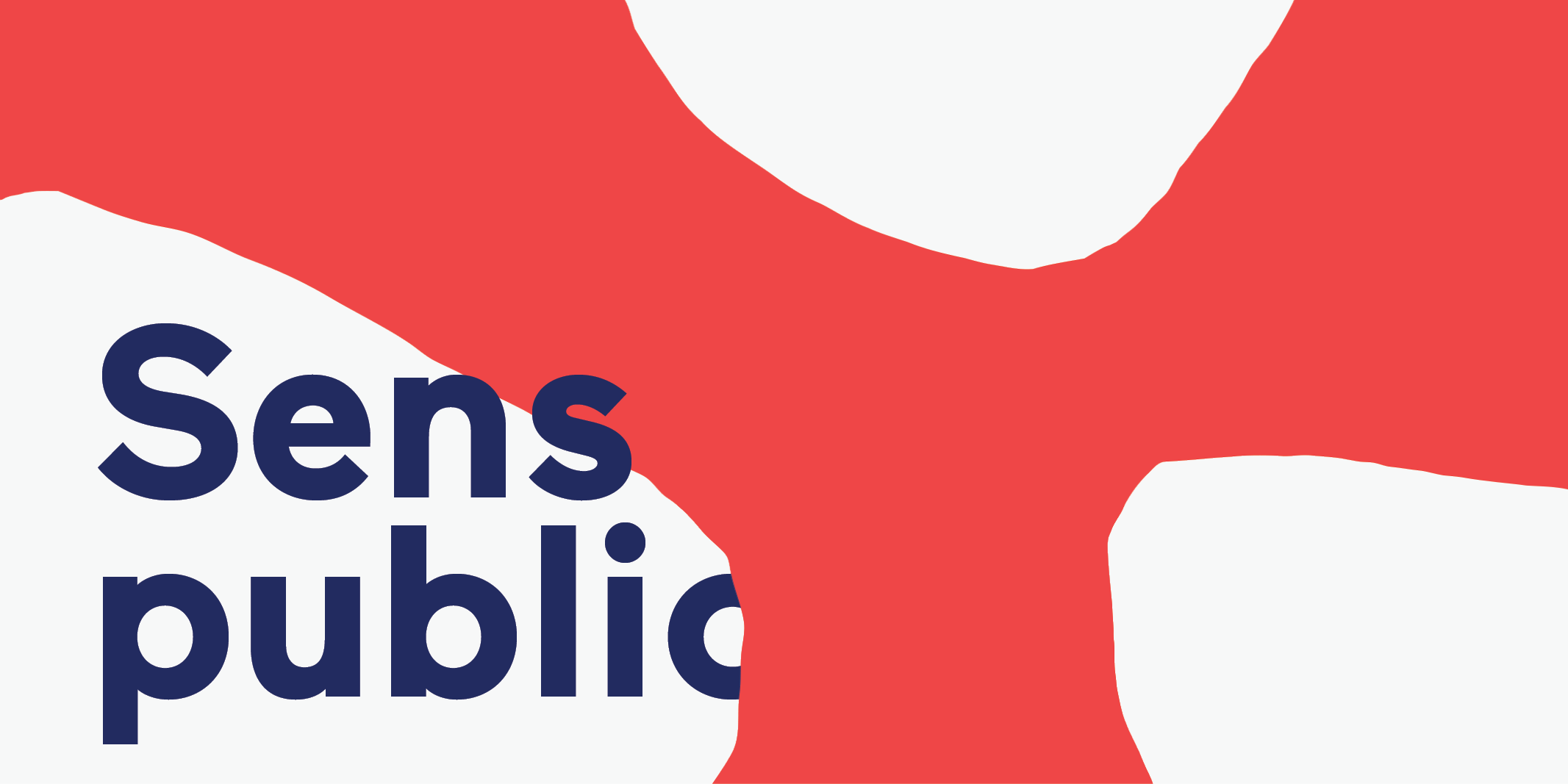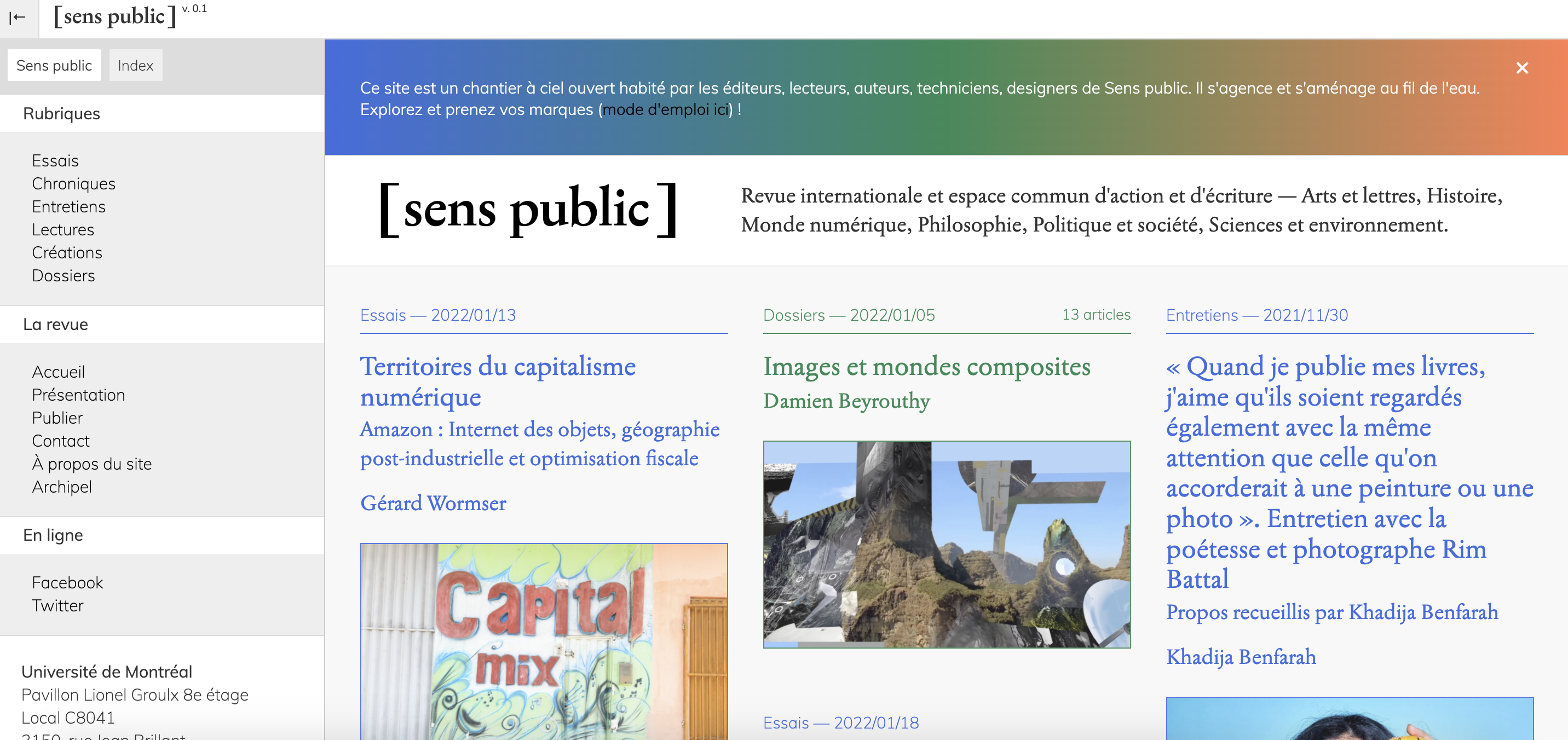
For this first interview, Étudit talked with Sens public, which describes itself as an international journal and a common space for action and writing. Launched in 2003, Sens public showcases digital culture through both what it publishes and what it has committed to. The journal is currently directed by Marcello Vitali-Rosati, Professor at the Department of French-language literatures at the Université de Montréal.
1. Can you explain to us in what context the journal Sens public appeared?
When Gérard Wormser founded Sens public in 2003, scholarly journals like the Revue des sciences morales et politiques and Annales ESC were reluctant to address topics stemming from obviously interdisciplinary approaches. The new generation of researchers were gaining skills in the writing, documentation, and sharing of research built on new technologies. Moving away from traditional scholarly editing, we took an editorial approach that lent credibility to a digital format still disparaged by academic institutions.
Creating a digital journal in 2003 meant becoming an agent in contemporary changes. That’s why the journal went straight to an online version, one of the first in its field. It also favoured interdisciplinarity, including in the methodological diversity of its editorial board. Nineteen years later, we realize that we made the right choice: digital publishing is now widespread and interdisciplinarity has been integrated into many research activities.
Reflecting on new forms of knowledge production and dissemination has become one of our publication axes. Indeed, today, this is a matter not only of how to do things digitally, but also of reflecting scientifically on the issues raised by all things digital.
2. The themes present in the journal are diverse and varied, ranging from art and literature to politics. Why did you choose such thematic variety?
The journal was founded based on two tenets. The first was that to renew humanities research, we need to take into account the radically new phenomena that affect its shape and methods. The second was that only digital publications could reach new readers. We had to accept that powerful conceptual tensions breathe life into intellectual research and its modes of dissemination. That’s also why we chose an interdisciplinary approach.
Journals have always been a central platform for new ideas. This was true even before university labs appeared in the last century, and it remains true as we create new research areas, such as digital culture studies.
3. The journal’s editorial philosophy describes Sens public as “un espace de rencontre, de conversation, de dialogue et de production de la connaissance” [a space to meet, to discuss, to engage in dialogue and to produce knowledge], putting a particular emphasis on digital culture. Does your desire to see the journal contribute to intellectual life go beyond the mere dissemination of scientific knowledge?
Yes, because the dissemination of ideas is just one part of their evolution. Conversation shapes ideas before they are published in an article; ideally, once they are published, they generate reactions, reappropriations, and new perspectives.
The journal is already working on encouraging dialogue and exchange during peer review, which is conducted using groups on the hypothes.is platform. Authors and reviewers can respond to one another by adding annotations and comments in the text itself. We find that these continuous exchanges are more fruitful than a reader report. Each party can clarify and deepen their thoughts about the article before its ideas are disseminated. This enriches the results considerably.
The conversation that follows idea dissemination is the hub around which Sens public is organizing new features under development for our website. We are planning experiments that will put into practice our reflections on knowledge production. These developments are informed by the dissertation of Nicolas Sauret, one of the journal’s members and collaborators. Defended in 2020, his dissertation, De la revue au collectif: la conversation comme dispositif d’éditorialisation des communautés savantes en lettres et sciences humaines [From journal to collective: the conversation as editorial device in scholarly communities of the humanities], is available online in open access.
4. One of the guiding principles of your journal is the use of open formats and software. Why are these important in scholarly publishing?
This practice is of vital importance on two counts: the production of articles and their data, and knowledge sustainability. We use tools that we’ve built ourselves and that we make available open source, or that are community-managed (such as Zotero). The technical choices that Sens public makes are drive by a political commitment.
We are not looking to adapt our practices and those of our authors to tools that aren’t designed for humanities research. Instead, we ask ourselves what we need and we develop our tools with an orientation to specific academic uses. We work hand in hand with developers and designers, which involves a lot of consultation and training with authors and users.
Using open formats and software guarantees some degree of data interoperability. For instance, our keywords are taken from the unique identifiers developed and maintained by the Bibliothèque nationale de France (BnF), while the authors’ biographies are filled in using their ORCID identification numbers.
Open formats are always accessible. If they are no longer supported by the individuals or groups that developed them, their source code is open, so it will always be possible to reconstruct a method to access the content of the files. In contrast, proprietary formats are protected by the intellectual property of a private company. That company can decide at any moment to cease maintaining a format or a software, leaving its users high and dry―unable to open their files, for instance. Subject to company vagaries, the knowledge contained within these files could potentially become unaccessible over time.
Our thinking is intimately connected to the tools we use to express our ideas. Should we leave this process in the hands of private companies when their mission is neither to ensure the sustainability of data nor to supply the tools best suited to the needs of researchers?
5. Do you have suggestions of articles to read that showcase the diversity of the themes presented in Sens public?
«Dibutade 2.0: la “femme-auteur” à l’ère du numérique», Servanne Monjour, 2015
This paper, written by a longtime collaborator and former coordinator of the journal, exemplifies the type of approach championed by Sens public: it navigates the intersection between disciplines and reflects on all things digital. The article provides a riveting reading that simultaneously mobilizes ideas from classical studies, art history, literature, philosophy, and digital humanities.
This article, by the founder of Sens public, demonstrates the journal’s emphasis on thinking about all things digital. Through criticism of Facebook and Mark Zuckerberg, this text examines the risks posed to democratic societies by the monopolistic situation created by Google, Apple, Facebook, Amazon, and Microsoft (collectively known as GAFAM), as well as how these companies compete for our attention.
«L’art olfactif contemporain, ses médias et leurs inventions fin-de-siècle», Erika Wicky, 2018
Sens public publishes on an ongoing basis, but many of our articles appear in thematic dossiers. This article appeared in a dossier that brought together research presented at a colloquium entitled “L’invention littéraire des médias” [The Literary Invention of the Media]. Wicky’s essay intersects contemporary art with an analysis of the novel L’Ève future (1886) by Villiers de l’Isle-Adam. The article uses these two sources to investigate the representation of olfactive art in their respective fin-de-siècle eras.
Dossier «L’ontologie du numérique», Servanne Monjour, Matteo Treleani, Marcello Vitali-Rosati, 2017
This interdisciplinary dossier—a “champ d’exploration des problématiques ontologiques du numérique” [space to explore the ontological issues raised by all things digital]— exemplifies the breadth of the reflections welcomed in the journal. Bringing together articles from a number of contemporary thinkers in the field of digital humanities, it explores the theoretical questions involved in developing an ontology of the digital, as well as considering how these issues are embodied in specific artistic, literary, and film objects.
«Présences de Josée Yvon dans la littérature québécoise contemporaine», Kevin Lambert et Martine-Emmanuelle Lapointe, 2020
While Sens public is an international journal that can boast a number of collaborators in France and in Brazil, it is also well grounded in the Department of French-language literatures at the Université de Montréal. Produced jointly by a PhD candidate and a professor at the department, this article zooms in on author Josée Yvon. It demonstrates how our journal participates in contemporary research in Québec literature.
